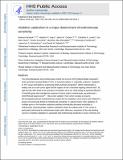| dc.contributor.author | Kanarek, Naama | |
| dc.contributor.author | Keys, Heather R. | |
| dc.contributor.author | Cantor, Jason R. | |
| dc.contributor.author | Lewis, Caroline A. | |
| dc.contributor.author | Chan, Sze Ham | |
| dc.contributor.author | Kunchok, Tenzin | |
| dc.contributor.author | Abu-Remaileh, Monther | |
| dc.contributor.author | Freinkman, Elizaveta | |
| dc.contributor.author | Sabatini, David M. | |
| dc.date.accessioned | 2020-04-29T17:46:30Z | |
| dc.date.available | 2020-04-29T17:46:30Z | |
| dc.date.issued | 2018-07 | |
| dc.identifier.issn | 0028-0836 | |
| dc.identifier.issn | 1476-4687 | |
| dc.identifier.uri | https://hdl.handle.net/1721.1/124927 | |
| dc.description.abstract | The chemotherapeutic drug methotrexate inhibits the enzyme dihydrofolate reductase1, which generates tetrahydrofolate, an essential cofactor in nucleotide synthesis2. Depletion of tetrahydrofolate causes cell death by suppressing DNA and RNA production3. Although methotrexate is widely used as an anticancer agent and is the subject of over a thousand ongoing clinical trials4, its high toxicity often leads to the premature termination of its use, which reduces its potential efficacy5. To identify genes that modulate the response of cancer cells to methotrexate, we performed a CRISPR–Cas9-based screen6,7. This screen yielded FTCD, which encodes an enzyme—formimidoyltransferase cyclodeaminase—that is required for the catabolism of the amino acid histidine8, a process that has not previously been linked to methotrexate sensitivity. In cultured cancer cells, depletion of several genes in the histidine degradation pathway markedly decreased sensitivity to methotrexate. Mechanistically, histidine catabolism drains the cellular pool of tetrahydrofolate, which is particularly detrimental to methotrexate-treated cells. Moreover, expression of the rate-limiting enzyme in histidine catabolism is associated with methotrexate sensitivity in cancer cell lines and with survival rate in patients. In vivo dietary supplementation of histidine increased flux through the histidine degradation pathway and enhanced the sensitivity of leukaemia xenografts to methotrexate. The histidine degradation pathway markedly influences the sensitivity of cancer cells to methotrexate and may be exploited to improve methotrexate efficacy through a simple dietary intervention. | en_US |
| dc.description.sponsorship | National Cancer Institute (U.S.) (Grant R01 CA129105) | en_US |
| dc.description.sponsorship | United States. Department of Defense (Grant W81XWH-15-1-0337) | en_US |
| dc.description.sponsorship | EMBO Long-Term Fellowship (ALTF 350-2012) | en_US |
| dc.description.sponsorship | American Association for Cancer Research (Grant 16-40-38-KANA) | en_US |
| dc.description.sponsorship | American Cancer Society (Grant PF-12-099-01-TBG) | en_US |
| dc.description.sponsorship | EMBO Long-Term Fellowship (ALTF 1-2014) | en_US |
| dc.language.iso | en | |
| dc.publisher | Springer Science and Business Media LLC | en_US |
| dc.relation.isversionof | 10.1038/s41586-018-0316-7 | en_US |
| dc.rights | Article is made available in accordance with the publisher's policy and may be subject to US copyright law. Please refer to the publisher's site for terms of use. | en_US |
| dc.source | PMC | en_US |
| dc.subject | Multidisciplinary | en_US |
| dc.title | Histidine catabolism is a major determinant of methotrexate sensitivity | en_US |
| dc.type | Article | en_US |
| dc.identifier.citation | Kanarek, Naama et al. “Histidine catabolism is a major determinant of methotrexate sensitivity.” Nature 559 (2018): 632-636 © 2018 The Author(s) | en_US |
| dc.contributor.department | Whitehead Institute for Biomedical Research | en_US |
| dc.contributor.department | Koch Institute for Integrative Cancer Research at MIT | en_US |
| dc.relation.journal | Nature | en_US |
| dc.eprint.version | Author's final manuscript | en_US |
| dc.type.uri | http://purl.org/eprint/type/JournalArticle | en_US |
| eprint.status | http://purl.org/eprint/status/PeerReviewed | en_US |
| dc.date.updated | 2020-01-29T15:52:12Z | |
| dspace.date.submission | 2020-01-29T15:52:16Z | |
| mit.journal.volume | 559 | en_US |
| mit.journal.issue | 7715 | en_US |
| mit.license | PUBLISHER_POLICY | |
| mit.metadata.status | Complete | |
